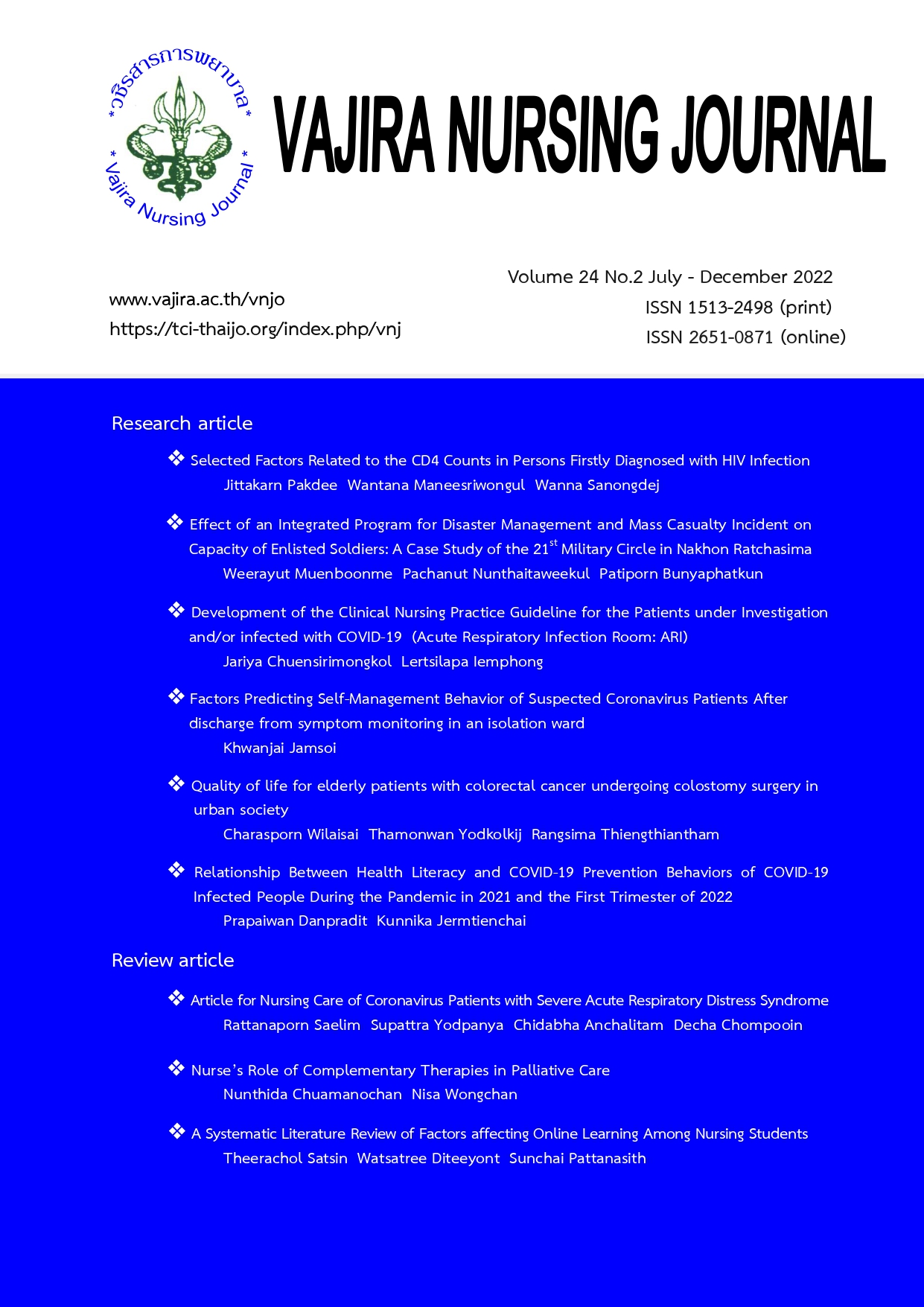การทบทวนวรรณกรรมอย่างเป็นระบบเกี่ยวกับปัจจัยที่เกี่ยวข้อง ต่อการเรียนผ่านระบบออนไลน์ของนักศึกษาพยาบาลศาสตร์
Main Article Content
บทคัดย่อ
โรคอุบัติใหม่ที่เกิดขึ้นอย่างรวดเร็วได้ทำให้สถาบันการศึกษาจำเป็นต้องมีการออกแบบและจัดทำการเรียนการสอนในรูปแบบออนไลน์ สถาบันการศึกษาด้านพยาบาลศาสตร์ก็มีความจำเป็นต้องมีการจัดการเรียนการสอนแบบออนไลน์เช่นเดียวกัน ซึ่งการออกแบบการเรียนการสอนในรูปแบบออนไลน์ให้ประสบความสำเร็จนั้น การทราบถึงปัจจัยที่เกี่ยวข้องต่อการเรียนผ่านระบบออนไลน์ได้กลายเป็นข้อมูลสำคัญจะช่วยให้การจัดการเรียนการสอนนั้นประสบความสำเร็จมากยิ่งขึ้น โดยเฉพาะอย่างยิ่งปัจจัยที่เกี่ยวข้องกับผู้เรียน ดังนั้น การทบทวนวรรณกรรมอย่างเป็นระบบในครั้งนี้มีวัตถุประสงค์คือเพื่อสังเคราะห์ปัจจัยที่เกี่ยวข้องต่อการเรียนผ่านระบบออนไลน์ของนักศึกษาพยาบาลศาสตร์ ผ่านการใช้วิธีการทบทวนวรรณกรรมอย่างเป็นระบบ ตามกรอบการสืบค้นตามกรอบแนวคิด PICO ทีประกอบไปด้วย ประชากรที่สนใจศึกษา(P) สิ่งแทรกแซง (I) สาเหตุหรือปัจจัย (C) ผลลัพธ์ (O) ผลการทบทวนวรรณกรรม พบว่า ปัจจัยที่เกี่ยวข้องต่อการเรียนผ่านระบบออนไลน์ของนักศึกษาพยาบาลศาสตร์ประกอบไปด้วยปัจจัยด้านตัวผู้เรียน คือความแตกต่างระหว่างเพศ ช่วงอายุ ประสบการณ์การเข้าถึงและใช้งานเทคโนโลยี ทัศนคติและพฤติกรรมการเรียน และปัจจัยภายนอกที่ส่งเสริมและสนับสนุนการเรียนรู้ ได้แก่ ความไว้วางใจต่อผู้สอน สื่อการสอนออนไลน์ และสภาพแวดล้อม
Article Details

อนุญาตภายใต้เงื่อนไข Creative Commons Attribution-NonCommercial-NoDerivatives 4.0 International License.
เนื้อหาและข้อมูลในบทความที่ลงตีพิมพ์ในวชิรสารการพยาบาลถือเป็นข้อคิดเห็นและความรับผิดชอบของผู้เขียนบทความโดยตรง ซึ่งกองบรรณาธิการไม่จำเป็นต้องเห็นด้วย หรือร่วมรับผิดชอบใด ๆ ทั้งสิ้น
บทความ ข้อมูล เนื้อหา รูปภาพ ฯลฯ ที่ได้รับการตีพิมพ์ในวชิรสารการพยาบาล ถือเป็นลิขสิทธิ์ของวชิรสารการพยาบาล หากบุคคลใดหรือหน่วยงานใดต้องการนำทั้งหมดหรือส่วนหนึ่งส่วนใดไปเผยแพร่ต่อหรือเพื่อกระทำการใด ๆ จะต้องได้รับอนุญาตเป็นลายลักอักษรจากวชิรสารการพยาบาลก่อนเท่านั้น
เอกสารอ้างอิง
Covid C, Team R, COVID C, Team R, Burrer SL, de Perio MA, et al. Characteristics of health care personnel with COVID-19—United States, February 12–April 9, 2020. Morbidity and Mortality Weekly Report. 2020;69(15):477.
World Health Organization. World report Coronavirus 2020. Geneva: WHO Press. 2020.
Satsin T., and Wongwiseskul S. Lessons Learn from Online Teaching: Challenges for Teacher under COVID - 19 Situations. J Royal Thai Army Nurses. 2021; 22(1): 1-9. (in Thai)
Swatevacharkul R. Autonomous Learning English English Program Learning Achievement. J. Edu. NU. 2016; 18(1): 22-23. (in Thai)
Edwards N, editor An analysis of the characteristics of self-directed learners and strategies to enhance self-directed learning in education systems: Transcending boundaries. The Asian Conference on Education 2015 Official Conference Proceedings; 2015.
Yensen J. PICO search strategies. Online Journal of Nursing Informatics. 2013;17(3).
Kummatid, A., and M. Markrat. Using the systematic review to provide a complete summary on a research question in evidence-based practice: a 3-step method. The Southern College Network Journal of Nursing and Public Health. 2015; 3(3): 246-259. (in Thai)
Munn, Zachary, et al. Methodological quality of case series studies: an introduction to the JBI critical appraisal tool. JBI evidence synthesis. 2020; 18(10): 2127-2133.
Stetler CB, Morsi D, Rucki S, Broughton S, Corrigan B, Fitzgerald J, et al. Utilization-focused integrative reviews in a nursing service. Applied Nursing Research. 1998;11(4):195-206.
Melnyk BM, Fineout-Overholt E. Evidence-based practice in nursing & healthcare: A guide to best practice: Lippincott Williams & Wilkins; 2022.
Sears K, Goldsworthy S, Goodman WM. The relationship between simulation in nursing education and medication safety. Journal of Nursing Education. 2010;49(1):52-55.
Thanormchayathawat B., Ratchathawan R., and Wiriyasirikul N. Factors Influencingthe Development of 21st Century Learning Skills among Nursing Studentsin Nakhon Si Thammara The Southern College Network Journal of Nursing and Public Health. 2019; 6(special): 91-105. (in Thai)
Kim S, Jeon J. Factors influencing eHealth literacy among Korean nursing students: A cross‐sectional study. Nursing & Health Sciences. 2020;22(3):667-674.
Lertsakornsiri M., Narumitlert J., and Samutpradit K. Factors Effecting on Learning Behaviors with Students’ Online Learning in Saint Louis College from COVID-19 Situations. Journal of Health and Health Management. 2021; 7(1): 13-27. (in Thai)
Subedi S, Nayaju S, Subedi S, Shah SK, Shah JM. Impact of E-learning during COVID-19 pandemic among nursing students and teachers of Nepal. International Journal of Science and Healthcare Research. 2020;5(3):68-76.
Songthai N, Yottavee N Saengkhiew P. Factors Influencing the Online Learning Behaviors of Nursing Students: The Lower Northern Region. Boromarajonani College of Nursing, Uttaradit Journa. 2021; 13(1). 198-209. (in Thai)
Kawitu K, Thansuk R, Ditajorn C, Mattavangkul C. The relationship between factors and adaptive behaviors for online learning and learning achievement of nursing students in a private university Journal of Health and Health Management, 2020; 7(2): 196-211. (in Thai)
Park J, Seo M. Influencing factors on nursing students’ learning flow during the COVID-19 pandemic: A mixed method research. Asian Nursing Research. 2022;16(1):35-44.
Kim S, Jeon J. Factors influencing eHealth literacy among Korean nursing students: A cross‐sectional study. Nursing & Health Sciences, 2021; 22(3): 667-674.
Torris C, et al. Nursing Students’ Perceived Learning Outcomes, Motivation to Learn and Grade Achieved in a Digital Blended Learning Course: A Norwegian Cross-Sectional Study. Education Sciences, 2022; 12(7): 467.
Regmi K, Jones L. A systematic review of the factors–enablers and barriers–affecting e-learning in health sciences education. BMC Med Educ. 2020;21(1):1-18.
Wang WT, Lin YL. The Relationships among Students’ Personal Innovativeness, Compatibility, and Learning Performance. Educ Technol Soc. 2021;24(2):14-27.
Sanongdej W, et al. Investigating Learning Process Factors Related to Online Learning and Physical Examinations Among Nursing Students. Arch Neurol Neurosci. 2021;9(5):20-21.
Prasertsong C, Sanghirunruttana J, Kladkaew P. The factor related to stress of online learning due to the COVID-19 situation among nursing students. J Somdet Chaopraya Inst Psychiatry. 2021;15(1):14-28. (in Thai)
Masha'al D, Rababa M, Shahrour G. Distance learning–related stress among undergraduate nursing students during the COVID-19 pandemic. J Nurs Educ. 2020;59(12):666-674.
Warshawski S. Academic self-efficacy, resilience, and social support among first-year Israeli nursing students learning in online environments during COVID-19 pandemic. Nurse Educ Today. 2022;110:105267.
Chang CY,Chung MH, Yang JC. Facilitating nursing students' skill training in distance education via online game-based learning with the watch-summarize-question approach during the COVID-19 pandemic: A quasi-experimental study. Nurse Educ Today. 2022;109:105-256.


